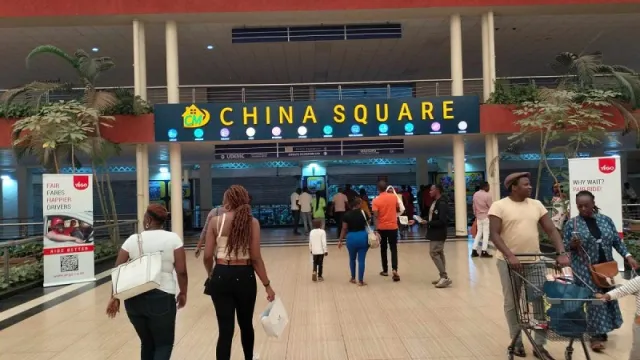China Square: A cultural shopping fusion in Kenya

China Square: A cultural shopping fusion in Kenya
From roads and railways to commerce, China's impact on Kenya's economy goes beyond debt. The aisles of Kenyan markets are witnessing a vibrant cross-cultural exchange as Chinese products and entrepreneurial spirit take center stage at local shopping centers.
The narrative of China's presence in Kenya has transcended politics and diplomatic ties, evolving into a dynamic economic partnership with a palpable impact on trade and daily life.
China's role in Kenya's infrastructure development, marked by signature projects like the Standard Gauge Railway and the Nairobi Expressway, brought with it an influx of Chinese workers, entrepreneurs, and businesspeople.
Chinese goods in local markets
This convergence of cultures has propelled the popularity of Chinese goods in local markets, breathing fresh life into the shopping landscape.
An emblem of this fusion is the newly established China Square, nestled within Unicity Mall along Thika Superhighway. Directly sourcing items from Chinese manufacturers, this retail shopping center has transformed the way Kenyans shop, providing a direct conduit to affordable Chinese goods. Since its opening earlier this year, China Square has generated buzz, with an impressive turnover of Kes20 million within its initial two weeks of operation.
The CEO of China Square, Lei Cheng, revealed that even on a less successful day, the sales never dipped below Kes10 million. The enthusiasm around this unique shopping destination is a testament to the growing demand for Chinese products at competitive prices.
Entering China Square feels like stepping into a physical Alibaba store, with a variety of goods brought to life. The mall's layout is expansive, housing everything from household essentials to electronics and home appliances. Chinese brands dominate the shelves, showcasing the extensive range of products manufactured by the Asian giant.
The mall's layout is thoughtfully organized, with the upper decks featuring towering rows and columns of numbered sections. From large kitchenware to intricate cutlery, electronic accessories to undergarments, China Square encapsulates diversity under one roof.
China Square's journey hasn't been without its share of challenges. A widely publicized fallout with Kenya's Trade Cabinet Secretary Moses Kuria occasioned temporary closure due to allegations of unfair competition from foreign investors. However, following successful negotiations, the mall reopened and business resumed. The mall's staff members reported a steady influx of buyers streaming in to procure items.
Read also: Moses Kuria calls for controls on bank forex trading
Affordability and Accessibility
The allure of Chinese goods in Kenyan markets is rooted in affordability and accessibility. Price sensitivity often guides consumer choices, making Chinese products an attractive option. These cost-effective alternatives align with the economic realities of many Kenyan households, creating a market niche for the supply of Chinese products.
China's influence on Kenya's economy extends beyond retail. From bustling stalls in Eastleigh to eateries in Kilimani, Chinese entrepreneurs have cultivated a dynamic business ecosystem. Their ventures cater to a diverse clientele, bridging cultural gaps while meeting consumer demands.
The growth of Chinese entrepreneurship in Kenya signifies a shared future of commerce, collaboration, and innovation. As China Square and similar ventures redefine the shopping experience, they also underscore the evolving dynamics of economic cooperation between China and Kenya.
In a world where economies are increasingly interconnected, the impact of Chinese products on Kenya's retail scene is an illustration of how partnerships can transform consumer experiences and reshape traditional market landscapes.



